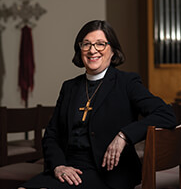Who Is A “Real” American?

Column by Presiding Bishop Elizabeth A. Eaton
My husband and I live in Skokie, Ill., a diverse community. Our neighbors to the west are an octogenarian Taiwanese Evangelical couple who regularly order meals from Kosher to Go. Our neighbors to the east are a Ukrainian and Russian multigenerational family. Our grocery stores have both kosher and halal departments. As I drive past the elementary school on my way to work, I see moms and dads in jeans along with women in saris or hijabs and men in thobes or yarmulkes. More than 90 languages are spoken in the homes of our school district. We pay our taxes, mow our (tiny) lawns, worship, raise our children and pretty much get along in our little village of Skokie.
Late one afternoon a few years ago I was finishing up yard work. I had been weeding and trimming all day. I was tired and grass-stained. Just one more pile of leaves needed to be swept up. I noticed a woman walking toward me so I hurried to get the sidewalk cleared. She stopped and told me that she had seen me working all day and thought I might be too tired to prepare supper. She had made a meal for me and my husband. It was during Ramadan—the month when Muslims fast from food and water during the day and engage in prayer and acts of charity. This was her act of charity and generosity. She smiled and walked away. I was stunned.
There has been an alarming rise in hate speech and violence against religious and ethnic minorities in this country. At the same time, we’ve seen an increased polarization among us, even in our dear church. There is a movement to define what it means to be a “real American.” Some would define this as white, Christian and native born. When Lutheran immigrants first came to this country in the 18th and 19th centuries, they weren’t considered real Americans. They didn’t speak English or fit in with the Deist, Calvinist religious majority. They were “other” and therefore suspect. German Lutheran immigrants weren’t considered white when they settled here. Neither were Irish, Italians or Poles. Catholics and Jews were considered an alien threat.
An element in our country wants to legislate that the United States is a Christian nation where Christianity should be privileged and only Christians should hold office. This is Christian Nationalism, which is neither Christian nor patriotic.
It’s ironic that the Puritans fled religious persecution and that the First Amendment states “Congress shall make no law respecting an establishment of religion, or prohibiting the free expression thereof,” yet an element in our country wants to legislate that the United States is a Christian nation where Christianity should be privileged and only Christians should hold office. This is Christian Nationalism, which is neither Christian nor patriotic. There is no doubt that the Founders were Christian and that a majority of Americans identify as Christian. That is different from declaring Christianity as the established religion of the United States. And, dear church, let’s be clear, a Christian Nationalist does not define Lutherans as “Christian.”
God knows I love my country. This beautiful, fragile, yet surprisingly resilient experiment in democracy and nationhood that’s not predicated on shared ethnicity is unique among nations. My grandfather, father and uncles all served during World War I and World War II. I had the honor of placing a wreath on behalf of the ELCA at the Tomb of the Unknown Soldier in Arlington National Cemetery. I won’t have my patriotism questioned. Christian Nationalism is a perversion of the gospel and a threat to our democracy. It’s precisely because I love my country that I warn against it.
Who is a “real American”? I say that my Muslim neighbor walking freely down the street in a hijab to offer a meal to her Christian neighbor during Ramadan is a real American. Motivated by her Muslim faith she acted as neighbor to me. She is not less American because she is Muslim. Because she is an American, she can be her authentic self and participate in building our community and country. What binds us together is not ethnicity but shared participation in our civic life springing out of our cultural heritages and working for the common good.
Originally posted at LivingLutheran.org.

